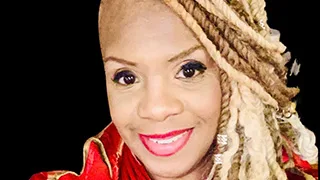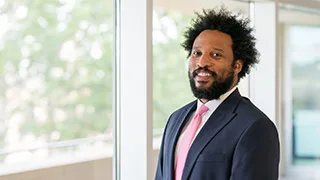
Stephanie Harris, Ph.D., is the newly-appointed director of Seton Hall’s Africana
Studies program.
The fall semester has brought some transformative changes to the Africana Studies program in the College of Arts and Sciences. This month, the program welcomed a new director, Stephanie Harris, Ph.D., former
executive director of the Amistad Commission for New Jersey’s Department of Education,
as well as two new faculty members, Carm Almonor, Ph.D., J.D. and Nkosi DuBois Anderson,
Ph.D.
“We are excited to welcome these new colleagues to Seton Hall and to the Africana
Studies program,” said Jonathan Farina, interim dean of the College. “Their expertise and scholarship, which covers African
American history, religion, philosophy, law, and political science, will add to the
rich academic experience available to our students through this unique, interdisciplinary
program.”
A public historian and graduate of Temple University’s doctoral program in African-American/Black
studies, Harris taught African American history at Richard Stockton College and Rowan
College. In her role with the Amistad Commission, she brought leadership and vision
to a state mandate which called for the infusion of African American content in the
K-12 social studies, civics and history curriculum, as well as related professional
development for teachers and public programs. The commission’s efforts have helped
make New Jersey a national model for a culturally infused curriculum resource for
social studies and English Language.
Harris said: “It is my honor and pleasure to join the Seton Hall family and unite
in our collective efforts to see the program’s much desired renaissance.” She believes
that students and teachers who pursue Africana studies, “have a relentless desire
to challenge any unjust societal perceptions of race, justice, equity, power, and
tradition.” As Harris sees it, that spirit is alive and well at Seton Hall — inspiring
the next generation of “global learners and thinkers” to hone their research, communications,
critical thinking and problem-solving skills through coursework in Africana studies.

Professor Carm Almonor teaches Introduction to African American Studies and Black
Culture, Law, and Politics.
Carm Almonor, Ph.D., J.D.
Professor Carm Almonor is teaching Introduction to African American Studies and Black
Culture, Law, and Politics this semester. Almonor has been an instructor at Rutgers,
Temple and Thomas Jefferson universities, and holds a doctoral degree in African American/Black
Studies from Temple University.
Almonor’s teaching, scholarship, advocacy and work as a constitutional lawyer is guided
by “democratic problem solving through multidisciplinary frameworks,” he writes. Combining
observations in law, politics, history and culture, Almonor’s policy research centers
on institutional cultural unities and historical continuities intersecting gender,
race and class structures.
Almonor’s research focus has included K-12 education, criminal justice and employment.
A past fellow of the Eagleton Institute of Politics at Rutgers University, the Public
Policy Lab based in Brooklyn and the American Bar Association Scholars, a global honor
society, Almonor is currently working on book projects and law review articles related
to political, cultural and historical analyses of his most impactful legal case and
policy precedents.

Assistant Professor Nkosi DuBois Anderson is teaching the History of the Civil Rights
Movement this semester.
Nkosi DuBois Anderson, Ph.D.
A South Orange native, tenure-track Assistant Professor Nkosi DuBois Anderson is teaching
the History of the Civil Rights Movement this semester. Previously, he was an instructor
at Hunter College and Union Theological Seminary in New York. Anderson holds a bachelor’s
degree in political science and a master’s degree in African American studies from
Columbia University. He earned a Master of Divinity, Master of Philosophy in Social
Ethics, and Ph.D. in Social Ethics from Union Theological Seminary. His dissertation
examined the historical associations between African American Christianity and socialism. His
primary areas of research are in the fields of Africana studies and religion. He has
worked in public education, government, and with religious, nonprofit, and community
groups. He also remains committed to a number of causes for social justice.
“The history, experiences, culture, and politics of people of African descent across
the globe is vast, diverse and interesting. Africana Studies seeks to explore these
phenomena. Similarly, the academic study of religion presents a wide range of inquiry
into the plurality of religious traditions, beliefs, movements, and theologies,” reflected
Anderson. “I’d recommend the full catalog of courses in both the program in Africana
Studies and the Department of Religion for students interested in developing their critical thinking skills and learning
about the world we live in – past, present, and future.”
The Africana Studies program at Seton Hall was the first program in New Jersey dedicated
to the study of African American history and culture at the college level. Started
in 1970, the program has introduced students to important content that examines the
experience of African Americans through the lens of history, culture, literature,
politics and religion.
Students major or minor in Africana Studies, or choose electives from a variety of
classes covering a mix of disciplines. For example, this semester students are exploring
history and impact of the Black church in a class taught by the former interim director
of the program, Rev. Forrest Pritchett, Ph.D. The program also includes classes on
mass-media, grassroot organizing, the civil rights movement, African history, modern
African American literature, and urban education through hip-hop.
“I am pleased that our searches yielded three extraordinary scholars from two of the
most prominent graduate institutions, that made major intellectual advances in this
field. I hope all students, faculty and entities of good will join us in welcoming
these outstanding individuals,” said Rev. Pritchett.
“Students at Seton Hall have a golden opportunity to explore the pivotal experiences
and countless important contributions that African Americans have made to this country.
My hope is that they will step out of their comfort zone and into one of the many
inspiring classes offered through Africana Studies. Without a doubt they’ll learn
something bold, new and life changing,” added Rev. Pritchett.
For more information about the Africana Studies program, please contact the College of Arts and Sciences.
Categories:
Education


